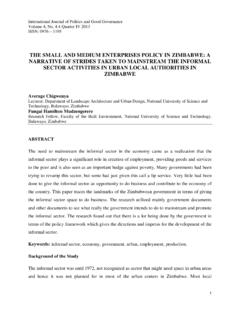Transcription of Corporate governance in central government departments
1 Corporate governance in central government departments : code of good practice April 2017. Corporate governance in central government departments : code of good practice April 2017. Crown copyright 2017. This publication is licensed under the terms of the Open government Licence except where otherwise stated. To view this licence, visit or write to the Information Policy Team, The National Archives, Kew, London TW9 4DU, or email: Where we have identified any third party copyright information you will need to obtain permission from the copyright holders concerned. This publication is available at Any enquiries regarding this publication should be sent to us at ISBN 978-1-911375-85-2. PU2077. Contents Page Foreword 3. Chapter 1 Parliamentary accountability 11.
2 Chapter 2 Role of the board 13. Chapter 3 Board composition 17. Chapter 4 Board effectiveness 21. Chapter 5 Risk management 25. Chapter 6 Arm's length bodies 27. 1. Foreword good Corporate governance is fundamental to any effective and well-managed organisation . be it private or public sector and is the hallmark of any Corporate entity that is run accountably and with the long-term interest clearly in mind. Ensuring that central government departments are run as efficiently and effectively as possible is central to this goal. By holding our public servants to the highest standards and providing them with strong, robust frameworks in which they can thrive while delivering public service, we can build a government that operates as smoothly as possible for the everyday citizen.
3 This updated code of good practice builds on the last code published in 2011, and reflects the steps we have taken since then to make government as efficient and effective as possible for the taxpayer. Since 2011, there has been a step change in the governance of central government departments . Secretaries of state now chair departmental boards, bringing a high level of focus on issues such as performance, risk management, talent and the challenge and scrutiny of major projects. This departmental board model is now embedded as a key element of the fabric of Corporate governance across central government departments . Boards help departments and the government succeed in achieving their aims by encouraging good planning, managing performance regularly and raising delivery capability.
4 They also help foster a culture of openness and good governance by providing a clear oversight structure. There are now over eighty non-executive board members across central government departments , bringing diverse experience from senior positions in large and complex organisations outside government . The introduction of the new role of government Lead Non-Executive, supported by a team in the Cabinet Office, has helped to co-ordinate this network and encourage successful collaboration between departments . Indeed, as the Prime Minister has recognised, the departmental board model has been an overall success, bringing useful external expertise and challenge into the running of departments . That is why it is important that the code supports the departmental board model as it continues to embed further in all departments across Whitehall.
5 We are determined that this code will continue to support good governance within the public sector supporting the government 's commitment to build a country that works for everyone and where everyone plays by the same rules. RT HON BEN GUMMER MP RT HON DAVID GAUKE MP. Minister for the Cabinet Office and Paymaster General Chief Secretary to the Treasury 3. 4. Departmental board model: summary government departments are not the same as for-profit corporations, but they face many similar challenges. They need to be business-like. They can do this by tapping into the expertise of senior leaders with experience of managing complex organisations. These experts will provide challenge and support through their membership of departmental boards, which will provide the collective strategic and operational leadership of government departments .
6 Box : Extract from the Ministerial Code Secretaries of state should chair their departmental board. Boards should comprise other ministers, senior officials, a Lead Non-Executive and non-executive board members, (largely drawn from the commercial private sector and appointed by the Secretary of state in accordance with Cabinet Office guidelines). The remit of the board should be performance and delivery, and to provide the strategic leadership of the department.. Source: Ministerial Code, Cabinet Office, December 2016, paragraph 1. Composition and remit The boards will be balanced, with roughly equal numbers of ministers, senior civil servants, and non-executives from outside government . They will be chaired by the Secretary of state and meet on at least a quarterly basis.
7 However, best practice is that boards should meet more frequently. Boards are advisory in the sense that they will provide advice to the department on issues within their remit, such as strategy and the deliverability of policies. They are supervisory in the sense that they scrutinise reporting from the department on performance, and challenge the department on how well it is achieving its objectives. Policy will be decided by ministers alone, with advice from officials. Boards will give advice and support on the operational implications and effectiveness of policy proposals, focusing on getting policy translated into results. They will operate according to recognised precepts of good Corporate governance in business: leadership, effectiveness, accountability and sustainability.
8 Boards advise on, and supervise, five main areas: strategic clarity, commercial sense, talented people, results focus, and management information. The board may choose for its committees to carry out some of its activities. As a minimum, there should be committees responsible for audit and risk assurance (the responsibilities of which will include reviewing the comprehensiveness of assurances and integrity of financial statements), and nominations (the responsibilities of which will include ensuring there are satisfactory systems for identifying and developing leadership and high potential, scrutinising the incentive structure and succession planning for the board and the senior leadership of the department). The board should also ensure that governance arrangements are sufficiently scrutinised; this responsibility may be discharged by the board itself or by a board sub-committee (such as the audit and risk assurance committee or a nominations committee), as the board sees fit.
9 1. 5. Board members' roles and responsibilities Principles of public life All board members should uphold the seven principles of public life (the Nolan principles): selflessness, integrity, objectivity, accountability, openness, honesty and leadership. Chair of the board The chair of the board will normally be the Secretary of state (the lead non-executive board member, or another ministerial board member, may occasionally deputise if necessary). He or she will maintain a high standard of discussion and debate, helping to steer the department by facilitating collective working and ensuring that systems are in place to provide board members with the support they need to carry out their role effectively, such as providing them with timely, relevant evidence on which to base their decisions.
10 Lead non-executive board member Each board will have a lead non-executive board member, who will meet regularly with other non-executive board members to ensure their views are understood and that the Secretary of state is made aware of any concerns (including through ensuring that the non-executive board members meet alone with the Secretary of state from time to time). The lead non-executive board member will support the Secretary of state in his or her role as chair of the board and liaise with the government Lead Non-Executive. Non-executive board members Non-executive board members, appointed by the Secretary of state, will be experts from outside government . They will come primarily from the commercial private sector, with experience of managing large and complex organisations.
















